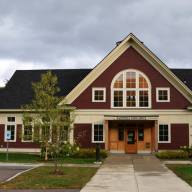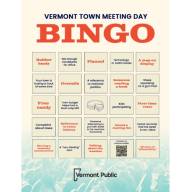Travel the back roads of any small Vermont town and one is likely bound to find one: an old farmhouse whose very aspect seems to radiate with stories of long ago. In Granville, one such building has beckoned to playwright Kate Youngdahl Stauss for years. Located on the corner of North Hollow and Butz Road, it’s a restored charmer called Simple Sage.
“I first learned about the significance of the house from the late Kendall Landis, whose family has owned and cared for it for the better part of 50 years. Kendall’s lively yarns about his mother and her friends in the 1930s, as well as a tantalizing fact from the 19th century, sent me on a years-long search through both local and national history,” she said.
Eventually those tales became the basis for her new play, “Simple Sage,” which debuts at The Theater located at the Valley Hub in Rochester, (formerly the high school auditorium) on November 7 and 8.
At the end of the 18th century, William Lamb and his wife, Mary Pratt Lamb, migrated from coastal Massachusetts to a burgeoning Vermont logging town known as Kingston. The royalist name wasn’t changed to Granville until 1833, by which time the family seems to have been flourishing with large land holdings and several children, ending in three daughters: Demarius, Lucenia, and Mellona.
Born six years apart in the early 19th century, the girls would have watched some of the greatest changes happening to the Green Mountains in modern times. As the need for timber boomed, enterprising eyes turned to Vermont, which was blanketed by old growth trees. By the 1840s, the residents of Simple Sage would no longer have looked out on dense forest but instead on windswept hills, stone walls, and Merino sheep.
Much of the wood was used to produce charcoal, an invaluable source of energy for industries, especially ironworking. Most every town had a forge. In Granville and neighboring Hancock, at least three of those forges were constructed by an ambitious young man by the name of John Deere who came over the pass from Middlebury.
‘Yes, that John Deere: he of the plough that broke the plains.
Deere didn’t have a lot of luck in Granville. For years he struggled to make a living, eventually leading him to abandon the state altogether and move to the Midwest. The rest, as they say, is history. But before that famous plough, before his departure from Vermont, there is an earlier event of local interest.
John Deere married Demarius Lamb at Simple Sage. And when Demarius died, the newly prosperous Deere made the nearly thousand-mile journey back to Granville to marry her sister Lucenia. Unlike her older and younger sisters, Lucenia had never wed. It was convention in that era that one girl should remain at home to take care of the parents, the lot that fell to the second youngest daughter.
“In the play, I imagine the close-knit relationship of sisters, the pain of loss, and the fortitude of leaving the only place you’ve ever known in order to sustain your family. But that is only one piece of the Simple Sage puzzle,” the author noted.
By the 1930s the gamble on hill farms and sheep had gone bust. In Granville, the families who built these farms had mostly moved away, and the structures were in shambles. By Kendall Landis’s reckoning, it was then that his mother and her friends learned of the properties while attending a New York City cocktail party.
“Anecdotally, the story goes that Mrs. Landis won a house in a poker game. It’s more likely she just bought it dirt cheap, sight unseen, from another partygoer. She named her dwelling Pig-in-a-Poke. Her dearest friend purchased Simple Sage, eventually bequeathing it to Kendall’s mother years later,” Youngdahl Stauss said.
“Even though his career took him around the world, Kendall always summered in Granville – a tradition carried on by his own sons and grandsons to this day. He once intimated to me that his mother had been unhappily married, and perhaps the true love of her life was her best friend,” she added.
“It struck me that those two women carving out space for each other in rural Vermont had some common themes with the three Lamb sisters. All faced impediments to happiness simply because they were female; all found ways to break through social constraints to find love; and – strangely – all were witnesses to monumental environmental degradation with links to Simple Sage: first the ravaging of Vermont’s forests and then the cataclysmic dust bowl of the 1930s which can be directly attributed to John Deere’s plough. That’s a lot of social and ecological transformation through the lens of a village whose population hovers around just 300 souls,” she continued.
Audience members can watch how their stories intertwine – five women, two centuries, and one house – when The White River Valley Players mount the premier of “Simple Sage,” at The Theater located at the Valley Hub in Rochester on Friday, November 7, at 7:30 p.m. and Saturday, November 8, at 2 p.m. and 7:30 p.m. Doors open 15 minutes before showtime. A live music cafe featuring desserts begins the festivities. Tickets are by donation. For more information, visit www.wrvp.org.
You might also like












